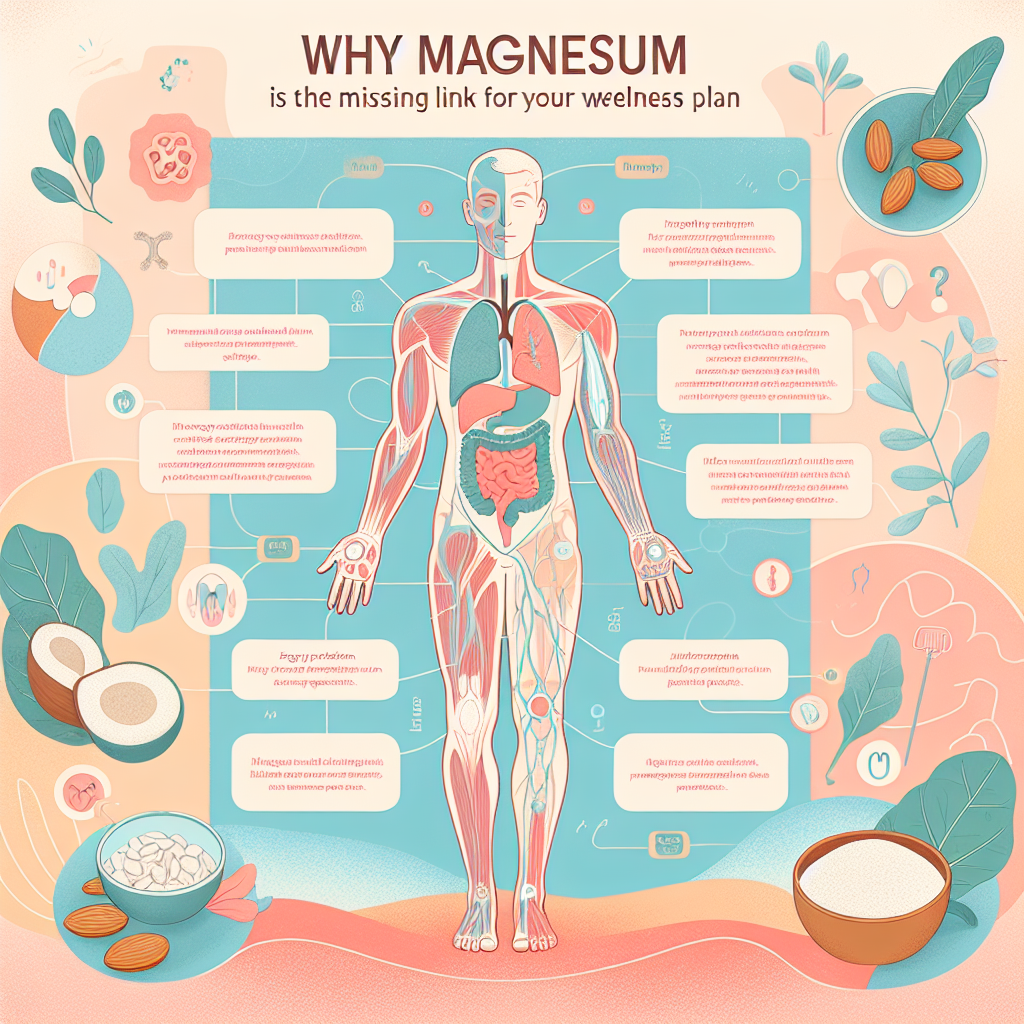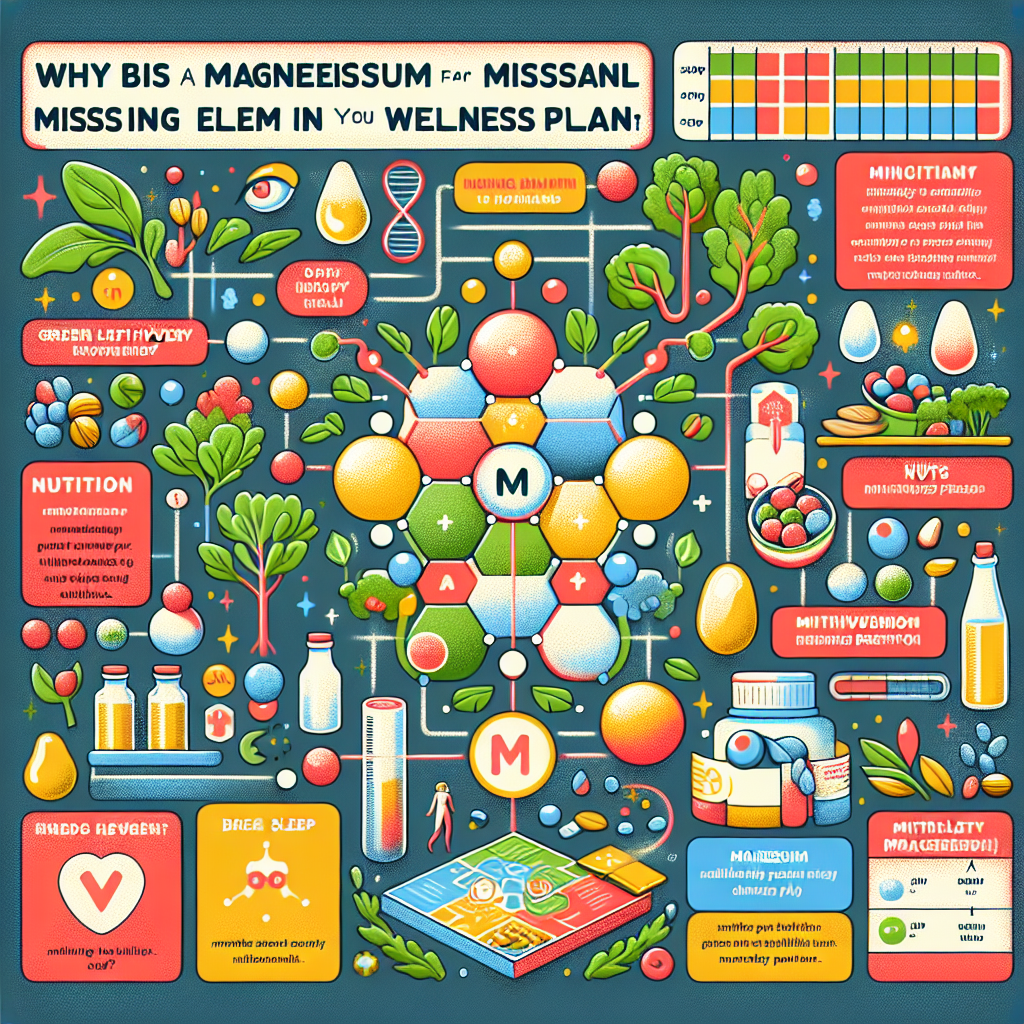Why Magnesium is the Missing Link in Your Wellness Plan

Discover why Magnesium is the missing link in your wellness plan! Uncover the benefits of this essential mineral and how it can enhance your health and wellbeing. Don’t wait, learn more today at Vibrant Vitality. Take the first step towards a healthier you.
Understanding the Role of Magnesium in Boosting Your Wellness Plan
Magnesium, a vital mineral often overlooked in the realm of health and wellness, is increasingly being recognized for its significant role in maintaining optimal health. It is the fourth most abundant mineral in the human body and is involved in over 300 biochemical reactions. Despite its importance, many people are unaware of its benefits and how it can enhance their wellness plan.
Magnesium plays a crucial role in various bodily functions. It aids in the production of energy, supports the immune system, and helps maintain normal nerve and muscle function. It also plays a significant role in bone health, with about 60% of the body’s magnesium found in the bones. Moreover, it is involved in the regulation of blood sugar levels and blood pressure, contributing to heart health and potentially reducing the risk of diabetes.
Despite the critical role magnesium plays in our bodies, it is estimated that nearly half of the US population consumes less than the recommended daily amount. This deficiency can lead to various health issues, including muscle cramps, fatigue, and even heart disease. Therefore, incorporating magnesium into your wellness plan can significantly improve your overall health.
One of the most effective ways to increase your magnesium intake is through diet. Foods rich in magnesium include green leafy vegetables, nuts and seeds, legumes, and whole grains. Dark chocolate is also a good source of magnesium, providing a delicious way to boost your intake. However, due to modern farming practices and soil depletion, the magnesium content in many foods has decreased over the years. Therefore, even with a healthy diet, it may be challenging to get enough magnesium from food alone.
Supplementation is another way to ensure you’re getting enough magnesium. There are various forms of magnesium supplements available, including magnesium citrate, magnesium glycinate, and magnesium oxide. Each form has its benefits and absorption rates, so it’s essential to choose the one that best suits your needs. However, it’s always recommended to consult with a healthcare professional before starting any supplement regimen.
In addition to diet and supplementation, another way to boost your magnesium levels is through topical application. Magnesium oil, a solution of magnesium chloride in water, can be applied directly to the skin. This method allows the body to absorb magnesium directly through the skin, bypassing the digestive system. It’s an excellent option for those who may have digestive issues or difficulty swallowing pills.
In conclusion, magnesium is a vital mineral that plays a significant role in many bodily functions. Despite its importance, many people are not getting enough of it, potentially leading to various health issues. By incorporating magnesium-rich foods into your diet, considering supplementation, and exploring topical applications, you can ensure you’re getting enough of this essential mineral. Remember, a well-rounded wellness plan is not just about exercise and diet; it’s also about ensuring your body has all the nutrients it needs to function optimally. And magnesium, often overlooked, could be the missing link in your wellness plan.
Why Your Wellness Plan is Incomplete Without Magnesium

Magnesium, a vital mineral, is often overlooked in wellness plans, despite its significant role in maintaining optimal health. It is the fourth most abundant mineral in the human body and is involved in over 300 biochemical reactions. From supporting a healthy immune system to maintaining bone health, magnesium is indeed a powerhouse nutrient. Yet, many people are unaware of its importance, leaving a gaping hole in their wellness plans.
The human body requires magnesium for a multitude of functions. It aids in the production of energy, supports the function of muscles and nerves, and even plays a role in DNA synthesis and repair. Moreover, magnesium is essential for the regulation of neurotransmitters, which send messages throughout the brain and nervous system. This mineral is also crucial for heart health, as it helps maintain a normal heart rhythm and blood pressure.
Despite its importance, magnesium deficiency is surprisingly common. According to the World Health Organization, up to 75% of Americans do not meet their recommended daily intake of magnesium. This deficiency can lead to a host of health problems, including muscle cramps, irregular heartbeat, and even mental health disorders such as anxiety and depression.
The reason for this widespread deficiency is twofold. Firstly, modern agricultural practices have led to a decrease in the magnesium content of soil, and consequently, our food. Secondly, our bodies’ ability to absorb magnesium decreases with age, certain medications, and the consumption of alcohol. Therefore, even those who consume a balanced diet may still fall short of their magnesium needs.
Incorporating magnesium into your wellness plan can have profound effects on your overall health. Studies have shown that adequate magnesium intake can improve sleep quality, reduce inflammation, and even enhance exercise performance. Furthermore, magnesium has been linked to a lower risk of developing chronic diseases such as type 2 diabetes and heart disease.
There are several ways to increase your magnesium intake. Green leafy vegetables, nuts, seeds, and whole grains are excellent sources of magnesium. Additionally, magnesium supplements are widely available and can be a convenient way to ensure you meet your daily requirements. However, it’s important to note that not all magnesium supplements are created equal. Some forms of magnesium are more easily absorbed by the body than others, so it’s crucial to choose a high-quality supplement.
In conclusion, magnesium is a vital nutrient that is often overlooked in wellness plans. Its role in numerous biochemical reactions makes it essential for overall health. Despite its importance, magnesium deficiency is common due to modern agricultural practices and decreased absorption. Incorporating magnesium into your wellness plan through diet or supplementation can have profound effects on your health, from improving sleep quality to reducing the risk of chronic diseases. Therefore, magnesium truly is the missing link in your wellness plan.
The Hidden Benefits of Magnesium in Your Wellness Journey
Magnesium, a mineral that is often overlooked in the realm of health and wellness, is a crucial component of our body’s functioning. It is involved in over 300 biochemical reactions, playing a vital role in everything from energy production to maintaining heart health. Despite its importance, many people are unaware of the benefits of magnesium, and it is often the missing link in their wellness plan.
Magnesium is a powerhouse mineral that supports a wide range of bodily functions. It aids in the production of energy, helping to fuel our bodies and keep us active throughout the day. It also plays a crucial role in muscle and nerve function, helping to maintain a regular heartbeat and supporting the immune system. Additionally, magnesium is essential for bone health, as it assists in the absorption of calcium, a mineral that is vital for strong bones and teeth.
One of the most significant benefits of magnesium is its ability to help manage stress and promote better sleep. It is known as the “relaxation mineral” because it has a calming effect on the nervous system. This can help to reduce anxiety and improve sleep quality, both of which are essential for overall wellness. Furthermore, research has shown that magnesium can help to alleviate symptoms of depression, further highlighting its role in supporting mental health.
Despite the numerous benefits of magnesium, many people are not getting enough of this essential mineral. This is largely due to modern farming practices that have depleted the soil of magnesium, leading to lower levels in the foods we eat. Additionally, certain lifestyle factors such as high levels of stress and consumption of processed foods can increase our body’s demand for magnesium.
The good news is that increasing your magnesium intake can be relatively simple. It is found in a variety of foods, including leafy green vegetables, nuts and seeds, and whole grains. Additionally, there are many high-quality magnesium supplements available that can help to boost your levels. However, it is always recommended to consult with a healthcare professional before starting any new supplement regimen.
Incorporating magnesium into your wellness plan can have a profound impact on your overall health and wellbeing. From supporting energy production to promoting better sleep, this powerhouse mineral offers a range of benefits that can help to enhance your wellness journey. However, it is important to remember that while magnesium is a crucial component of health, it is just one piece of the puzzle. A balanced diet, regular exercise, and a healthy lifestyle are all essential for optimal wellness.
In conclusion, magnesium is a vital mineral that is often overlooked in wellness plans. Its wide range of benefits, from supporting physical health to promoting mental wellbeing, make it a crucial component of any wellness journey. By increasing your intake of magnesium-rich foods or considering a supplement, you can ensure that you are giving your body the nutrients it needs to thrive. So, if you’re looking to enhance your wellness plan, don’t overlook the hidden benefits of magnesium. It could be the missing link you’ve been searching for.